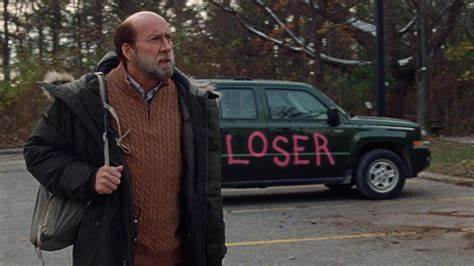
In the wide range of roles played by the great Nicolas Cage throughout his career, it is easy to focus on the iconic, larger than life characters, such as Castor Troy, Dracula, or indeed Nicolas Cage. There was also the era of Cage as unlikely action hero in the 90s and beyond, and he has undeniable coolness and a commanding presence, but what might be overlooked is how great Cage is at playing the Loser; whether low-level criminal failures like H.I. McDonnough in Raising Arizona or Sailor Ripley in Wild at Heart, outcasts from society like his Oscar-winning turn in Leaving Las Vegas or his equally excellent work in Pig, or the sort of paralyzingly neurotic, nebbishy nerds that launched his action star career (The Rock) and earned his only other Oscar nomination (Adaptation).
In Dream Scenario, Cage is this latter sort of Loser writ large; the word is literally spray-painted across his car at one point. College biology professor Paul Matthews is at once pitiable and deeply unlikeable, a well-meaning but ineffectual mass of off-putting tics and awkward mannerisms that painfully bare his innate insecurities. In Cage’s masterful performance, you can sense Paul’s halitosis through the screen. His beard probably smells funny too, and he’s making the absolute worst of the male-pattern baldness Cage has disguised in so many roles over the years. He is perpetually talking about a book he’s been thinking about writing but can’t find the time; from the defeated, shifty-eyed way he says this, it’s clear he is held back not by time constraints but the fear that actually beginning the work will only lead to inevitable failure. Paul is the kind of guy who, when unexpectedly seduced by a very attractive, much younger woman, farts, cums almost immediately, farts again, then bursts into tears.

For example.
The film begins with a dream scene, and throughout the narrative it is often a bit uncertain whether things are happening in reality or one of the characters’ dreams. In this opening dream, Paul’s daughter is floating away into the air while he simply stands by and watches. Paul is disturbed by this when she tells him about it, being all too conscious of his own ineffectuality and worrying that this is how she sees him in reality. When other people begin seeing him in their dreams, it’s the same way; he is just a passive bystander as catastrophic events take place around him. Paul is somehow not only appearing in other people’s dreams, but appearing as a manifestation of his own subconscious feelings of inadequacy.
Despite doing nothing, in the dreams or reality, Paul finds himself suddenly famous in a way no one before him has ever been. He claims to have no interest in fame, but he certainly desires recognition within his own cloistered academic world at least, and with the help of a PR firm called Thoughts? (made up of much younger people who are decidedly not the demographic for the nonfiction book about ants he wants to write), he attempts to use the fame to his advantage. Perhaps as some sort of cosmic retribution for this hubris, the nature of the mass shared dreams changes, with Paul now appearing not as a passive interloper but a violent attacker, torturing, raping and murdering the dreamers. Despite having done nothing wrong in reality, Paul suddenly finds himself on the other side of fame, ostracized and reviled; in the parlance of the times, canceled.

Dream Scenario is an intriguing look at the sometimes random nature and cruel twists of fame as well as a fascinating character study anchored by a superb performance from an actor with his own complex relationship with fame, a tremendously talented and serious artist who has also become a cartoonish caricature of himself in modern meme culture. He has embraced and participated in this side of his legacy as well, playing a version of himself in last year’s The Unbearable Weight of Massive Talent; a version of himself, it is worth noting, that is also something of a Loser, struggling with his own feelings of inadequacy.
Seeing one of our finest actors in a role he believes in is well worth the ticket price alone, but Dream Scenario lives up to its star turn as a marvelously funny, unsettling, and ultimately melancholy story reminiscent of early Charlie Kaufman, as well as co-producer Ari Aster’s epic nightmare Beau Is Afraid, whose Loser protagonist shares a spiritual affinity with Paul. Both are sad, frightened men longing equally for recognition and freedom from the kind of scrutiny that would expose their great weakness, the dichotomy between these desires twisting and wrenching their souls. Fame is a hungry lion and, like the zebra Paul lectures about in his class, once he has been marked by it he will forever stand out from the herd, no longer safely unremarkable and unnoticed.
Leave a Reply